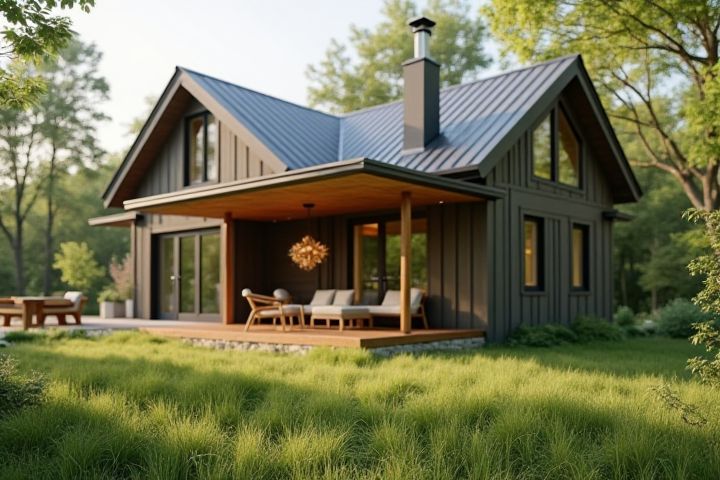
Choosing a sustainable house offers numerous benefits that extend beyond aesthetics and comfort. These homes are designed to minimize environmental impact by utilizing eco-friendly materials, energy-efficient appliances, and renewable energy sources such as solar panels. This not only reduces your carbon footprint but can also lead to significant savings on utility bills over time. Additionally, sustainable houses often feature advanced insulation and ventilation systems, resulting in improved indoor air quality that enhances your overall well-being. Investing in a sustainable home represents a commitment to a more responsible and efficient lifestyle, ensuring a healthier planet for future generations.
Why Choose A Sustainable House
Energy efficiency
A sustainable house enhances energy efficiency by utilizing advanced insulation techniques, which can reduce energy consumption by up to 50%. Incorporating energy-efficient appliances, such as those certified with the ENERGY STAR label, can lower your electricity usage, saving homeowners around $300 annually. Solar panels, which can generate approximately 80% of a household's energy needs, provide a renewable energy source that decreases reliance on fossil fuels. By choosing a sustainable house, your overall carbon footprint can be significantly minimized, promoting environmental conservation while potentially increasing property value by 5-10%.
Reduced carbon footprint
Choosing a sustainable house significantly reduces your carbon footprint, contributing to a healthier environment. By utilizing energy-efficient appliances, renewable energy sources, and sustainable building materials, these homes minimize greenhouse gas emissions. Incorporating features such as solar panels, rainwater harvesting systems, and high-performance insulation can significantly lower energy consumption. You can take pride in knowing that your sustainable home not only benefits your utility bills but also plays a crucial role in combating climate change.
Lower utility costs
Choosing a sustainable house can significantly lower your utility costs, as energy-efficient designs prioritize insulation and ventilation to minimize heating and cooling expenses. Homeowners can experience savings of 20% to 50% on energy bills through the use of renewable energy sources like solar panels, which can offset conventional energy expenses. Water-efficient fixtures and rainwater harvesting systems further contribute to reduced water bills, often cutting consumption by up to 30%. By investing in a sustainable home, you not only reduce your monthly expenses but also increase the property's long-term value through potential energy credits and tax incentives.
Healthier indoor environment
A sustainable house emphasizes a healthier indoor environment through the use of non-toxic materials and enhanced ventilation systems, which can lead to a 50% reduction in indoor pollutants. By incorporating natural lighting solutions, these homes can decrease the likelihood of mood disorders and improve overall well-being. Energy-efficient appliances not only lower utility bills but also contribute to a quieter, more comfortable living space, often leading to a 30% improvement in air quality. Choosing a sustainable house can result in fewer allergens and respiratory issues, promoting long-term health benefits for you and your family.
Use of sustainable materials
Choosing a sustainable house means prioritizing the use of sustainable materials, which can significantly reduce your carbon footprint. Sustainable materials, such as bamboo and reclaimed wood, often have lower environmental impacts and are renewable, with bamboo growing up to 3 feet per day. By opting for materials sourced from responsible suppliers, you contribute to preserving ecosystems and reducing waste in landfills. Investing in a sustainable house not only enhances your home's energy efficiency, potentially saving you 30% on energy costs, but also promotes a healthier living environment for you and your family.
Minimal environmental impact
Choosing a sustainable house significantly reduces your carbon footprint, contributing to the fight against climate change. These homes often utilize energy-efficient appliances and renewable energy sources like solar panels, minimizing reliance on fossil fuels. Furthermore, sustainable houses typically incorporate eco-friendly materials, which not only lower environmental impact but also enhance indoor air quality. By opting for a sustainable home, you invest in a healthier future for yourself and the planet.
Increased property value
Investing in a sustainable house can significantly increase your property's market value, appealing to environmentally-conscious buyers. Homes equipped with energy-efficient systems, such as solar panels and high-quality insulation, not only lower utility bills but also enhance long-term attractiveness. Additionally, sustainable properties often qualify for green certifications, which can further differentiate them in competitive housing markets. By prioritizing eco-friendly materials and practices, you create a desirable living space that aligns with current trends and consumer preferences.
Government incentives and rebates
Choosing a sustainable house can significantly benefit you financially due to various government incentives and rebates aimed at promoting energy efficiency. As of 2023, homeowners may qualify for tax credits, which can cover up to 30% of eligible renewable energy equipment costs, including solar panels and geothermal heat pumps. Many states offer rebates ranging from $1,000 to $10,000 for energy-efficient home improvements, such as insulation, energy-efficient windows, and Energy Star appliances. By leveraging these financial incentives, you can reduce your upfront costs while contributing to environmental sustainability, ultimately leading to long-term savings on energy bills.
Resilience to climate change
Choosing a sustainable house designed with a focus on resilience to climate change ensures long-term durability and adaptability. These homes often incorporate energy-efficient materials, renewable energy systems, and water conservation techniques, significantly reducing environmental impact. By utilizing natural ventilation and insulation, they maintain comfortable indoor climates, which reduces reliance on heating and cooling systems. Investing in such a property not only supports eco-friendly living but also enhances your home's value in an increasingly climate-conscious market.
Ethical and responsible living
A sustainable house embodies ethical and responsible living by minimizing environmental impact and promoting resource efficiency. These homes often utilize renewable energy sources, such as solar panels, which can reduce utility costs by 50% or more over time. Sustainable materials, like bamboo and reclaimed wood, ensure a lower carbon footprint while contributing to indoor air quality. By choosing a sustainable home, you actively support eco-friendly practices that preserve natural resources for future generations.
